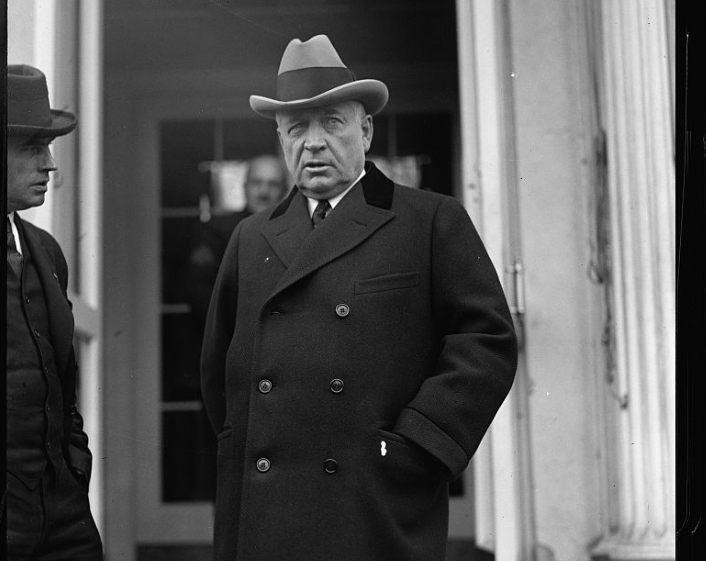The Minor Farce that Unfolded the First Time the Republicans Came to Cleveland
Let’s go back to 1924.

Frank Lowden in December 1923. (Photo: Library of Congress)
Ninety-two years ago, in Cleveland, a bunch of Republicans gathered at their convention to nominate a presidential ticket.
A few weeks before the Democrats held their own disastrous convention in Madison Square Garden, the Republicans, in early June, met at Cleveland’s then still-new Public Auditorium to argue, and vote, and pick who they thought could beat the Democrats in the fall.
The race for the presidential nominee had a clear frontrunner: incumbent Calvin Coolidge, who had ascended to the presidency after the death of Warren G. Harding, probably the worst American president of all time.
But Frank Lowden, a former governor of Illinois who came within a few votes of being the Republican nominee in 1920—only to lose to Harding—thought he also had a chance. Lowden hoped the infamous Teapot Dome scandal, in which a Harding cabinet member was convicted of accepting bribes from oil companies and sent to prison, would hurt Coolidge, too.
But Coolidge won the presidential nomination handily, dashing Lowden’s hopes, if not his pride. What happened next was what sent the convention into pure farce: Lowden won the nomination for the vice presidency—and then declined it, just as he had vowed he would. In doing so, he became the first, and only, politician to ever reject a major party’s nomination for the second highest office in the land.
This is, of course, unlikely to happen this year. The nomination of Mike Pence for vice president, set to take place this week at the Republican convention in Cleveland, will be a mere formality. A true open Republican convention hasn’t happened since 1976, and, since then, political conventions have only become increasingly more boilerplate.
There are speeches, and votes, and state delegates, and super-delegates, and thick books of party rules, but very few true surprises. At this stage, there is little doubt, for instance, that Donald Trump will be the Republican presidential nominee, even if, by party rules, he isn’t officially the nominee just yet.

Live elephants are seen in the lower right, in a shot from outside the Public Auditorium. (Photo: Public domain)
This was not the case in 1924, decades before binding presidential primaries and in the figurative teenage years of political conventions, when they still mattered, and when white men in smoke-filled rooms really decided the future of American democracy.
After the close race of 1920, Lowden thought that 1924 might just be his year to triumph. But the first ballot in 1924 was something close to unanimous: Some 1,065 delegates voted for Coolidge, a lawyer and former governor of Massachusetts, while two other candidates—Lowden not among them—got just 44 votes.
Coolidge was going to be the Republican nominee. Lowden was not going to be. The only other thing left to do was to choose Coolidge’s running mate.
Which is when the 1924 Republican convention went from the routine to the bizarre. Before the vice presidential vote, a delegate from Lowden’s home state of Illinois read a statement to convention attendees.
“It is with deep regret that Illinois must say to this convention … the determination of former Governor Lowden not to be a candidate, and in saying he cannot accept the nomination, is final and irrevocable,” John G. Oglesby, chairman of the Illinois delegation, told the delegates.
What happened next was even stranger: the delegates voted for Lowden to be vice president anyway. There were three votes, with Lowden getting a majority on all of them and finishing with 776 votes, or 555 more than his competitors combined, at which point, his nomination was made unanimous.
And then the real farce ensued, according to a lengthy contemporaneous account given by a delegate named Godfrey Luthy.
Told of the results of the vote by phone, Lowden then sent a telegram to the convention, reiterating his choice to decline the nomination, a message which conventioneers plainly ignored. The convention later received two more messages from Lowden, the first by way of the Associated Press.
“I told the public I was not to be a candidate for Vice President,” Lowden wrote. “I will not go back on my word.”
A second message, this time by telegram, was a bit more unequivocal, after the chairman of the convention tried to negotiate with Lowden and, presumably, plead the delegates’ case.
“I have said a thousand times, I think, that I would decline if nominated,” Lowden wrote. “I must keep my word. To yield now would mean the loss of my self-respect.”
And it was, at this point, that the conventioneers finally got the message: A final vote earned Charles Dawes, a former Army general from Ohio, a spot on the Republican ticket.
Lowden ran a final time for the Republican presidential nomination in 1928, but came in a distant second to Herbert Hoover, and henceforth retired from public life. He died in 1943 at the age of 82, his highest ambition having turned into not much more than a historical footnote.








Follow us on Twitter to get the latest on the world's hidden wonders.
Like us on Facebook to get the latest on the world's hidden wonders.
Follow us on Twitter Like us on Facebook